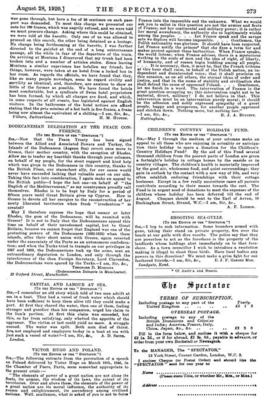DODECANESIAN DELEGATION AT THE PEACE CON- FERENCE.
[To TEL EDITOR or THE " SPECTATOR."]
SIR,—Now that the Peace Treaty has been signed between the Allied and Associated Powers and Turkey, the Islands of the Dodecanese (Aegean Sea) revert once more to Greece, their mother country, with the exception of Rhodes. Allow me to tender my heartfelt thanks through your columns, on behalf of my people, for the stout support and kind help which was given to the Dodecanese in this country, thanks to the British Press, our staunchest ally, for our cause would never have succeeded lacking that valuable asset on our side. Taking this fact into consideration, I again make an appeal to the British public—I hope the last one—on behalf of " the English of the Mediterranean," as my countrymen proudly call themselves. Rhodes is to be kept by Italy for a period of fifteen years until Great Britain gives up Cyprus. How is Greece to devote all her energies to the reconstruction of her newly liberated territories when fresh " irredentism " is created?
May I therefore express the hope that sooner or later Rhodes, the gem of the Dodecanese, will be reunited with Greece? It is not to Italy that the Dodecanesians appeal this time on behalf of their unredeemed capital, but to Great Britain, because we cannot forget that England was one of the protecting powers of the Dodecanese (1832-1835) when these islands, after their short union with Greece, again reverted under tha suzerainty of the Porte as an autonomous confedera- tion; and when the Turks tried to trample on our privileges in 1867 and 1869, the Dodecanesians took up the arms, sent an extraordinary deputation to London, and only through the interference of the then Foreign Secretary, Lord Clarendon, the Dodecanesians were spared by the Turks.—I am, Sir, &c., THEODORE D. MoscoNs
(Dodecanesian Delegate in Manchester). 32 Oxford Street, Manchester.


































 Previous page
Previous page